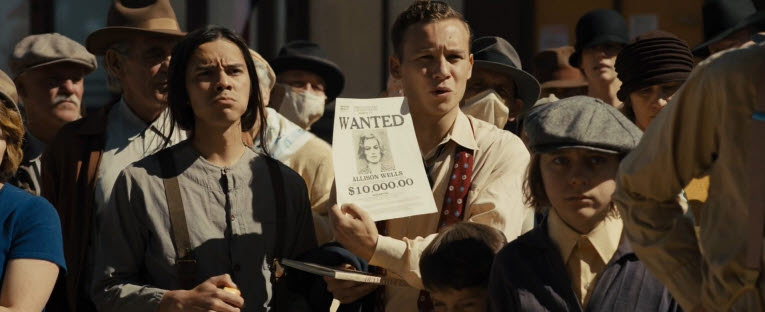“Dreamland”, which had a premiere at the Tribeca Film Festival in April 2019 but only got released in US around the end of last year, is a lackadaisical crime period drama which does not break no particular ground in its genre territory. While it occasionally shows that the folks behind and in front of the camera did try as much as they could, the movie frequently stumbles due to its weak narrative and characterization, and we come to observe the story and characters from the distance just like its narrator.
The narrator is a Texan woman named Phoebe Evans (Lola Kirke), and she reminisces about what happened to her older half-brother Eugene (Finn Cole) and their family during the early 1930s. Before Phoebe was born, Eugene’s parents settled in a remote rural town of Texas along with their little son, but Eugene’s parents subsequently became estranged to each other due to their personal matter as well as their difficult financial situation, and Eugene’s father eventually left his family on one day. It seemed he went to Mexico as reflected by a postcard sent to his young son later, but then he never contacted his young son or his wife, who came to marry a guy named George Evans (Travis Fimmel) not long after that.
Because George has worked as a deputy sheriff of the town, he can provide some financial stability to his family, and Eugene’s mother Olivia (Kerry Condon) appreciates that – especially when many of her neighbors struggle a lot with a long period of drought in their area. As their corn farms are seriously ruined by the drought and the following dust storms, most of town people find themselves on the verge of losing their homes and farms, and some of them including the family of Eugene’s best friend have already been considering leaving for California.
However, Eugene’s mind is usually occupied with numerous pulp magazines full of crime stories, and he is certainly excited when the town sheriff notifies to him and other town people that an infamous female bank robber named Allison Wells (Margot Robbie) is presumed to be somewhere around the town. A few days ago, Wells and her accomplice attempted to rob a bank located in a nearby town, but that led to a disastrous consequence as they subsequently had a shootout with the local police, and several civilians including a little young girl died in the end. While her accomplice was later found dead outside that town, Wells is still on the run, and a considerable amount of bounty is already put on her.
Although he has no idea on Wells’ whereabouts just like others, Eugene finds himself attracted toward a very slight but tempting possibility of finding her, and, what do you know, he later discovers that she is actually hiding in the barn of his family house. Because she has a serious physical injury, Wells requests him to help her, and, after an anxious moment of negotiation between them, Eugene decides to help her just because she may provide him not only lots of money but also a chance to go to Mexico and then find wherever his father is right now.
As he comes to help her more, Eugene naturally becomes more fascinated with Wells, and Wells is certainly willing to take advantage of that. As they talk more with each other, running away to Mexico along with her looks more plausible to him, so he comes to take more risks for her even though his stepfather and others are still looking for her as before.
We accordingly get several tense scenes including the one where young Phoebe (Darby Camp) attempts to go inside the barn due to her innocent curiosity, but the screenplay by Nicolaas Zwart does not generate much narrative momentum as languidly trudges from one expected plot turn to another, and it is also hampered by the lack of human depth in its two main characters. While Eugene is not a particularly interesting hero to hold our attention from the beginning, Wells remains to be a broad archetype as merely being swung back and forth between sympathy and suspicion, and that is why the third act where they can finally be more honest which each other does not work as well as intended.
In addition, director Miles Joris-Peyrafitte has many of key scenes in the film accompanied with blatant jump cuts, which are totally unnecessary in my trivial opinion. This visual choice is probably intended to show us more of our two main character’s thoughts and feelings, but the result only feels distracting while putting more distance between us and the story itself, and we are left with hollow impressions even during what is supposed to be a dramatically devastating moment around the end of the movie.
Anyway, the main cast members of the film mostly acquit themselves well despite being stuck with flat and uninteresting characters. While Finn Cole occasionally looks strained in his fairly diligent efforts, Margot Robbie, who also participated in the production of the movie, is uncannily reminiscent of Jessica Lange in “The Postman Always Rings Twice” (1981), and you may find yourself wishing that she could get a better femme fatale character someday. In case of Travis Fimmel, Garrett Hedlund, Kerry Condon, and Darby Camp, they are under-utilized in their thankless supporting roles, and Fimmel manages to leave some impression as a guy who has some decency despite not being a good father and deputy sheriff.
Overall, “Dreamland” surely evokes its many notable predecessors including, yes, “Bonny and Clyde” (1967), but it blandly fails in enlivening its story and characters enough to engage and entertain us. To be frank with you, it is already being evaporated in my mind without much regret, and I am already ready to move onto other films which may entertain me more.










